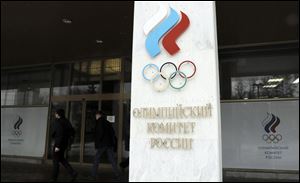
EDITORIAL
Post-truth Olympics
12/11/2017
Russia has been disqualified from competing in the 2018 Winter Olympic Games after a long investigation found the country guilty of an extensive state-backed doping program.
The International Olympic Committee’s step was unprecedented — and, to hear Russian authorities tell it, unfair and political.
When the Winter Olympics begin in PyeongChang, South Korea, in February, Russian athletes who are proven to be clean of the performance-enhancing drugs the IOC believes Russia encourages its athletes to use systemically will be allowed to compete. They will not be able to compete as part of an official Russian team, however. They will be at the Olympics under a neutral flag. They will not wear Russian uniforms, but IOC-designed outfits that identify them as “Olympic Athletes from Russia.”

People walk past the building of Russian Olympic Committee in Moscow. The International Olympic Committee has barred the Russian team from competing at the Winter Olympics in Pyeongchang, South Korea in February over widespread doping at the last Winter Games in 2014.
Click here to view more Blade editorials
Doping has overshadowed Olympic competition and most other international sports for decades. Cheating threatens the integrity of the games, which is why the IOC and other sport governing bodies have been forced to create elaborate systems to test athletes and catch those who are trying to gain an unfair advantage.
Russia and its leader Vladimir Putin plainly see the Olympic stage as an important place to assert Russia’s dominance. Russia hosted the last winter games in 2014, winning more medals than any other participating country. But the IOC has since stripped athletes of half a dozen of those medals in what it has determined is not just doping, but a state-sponsored, coordinated campaign to cheat.
The system of cheating was so pervasive and elaborate, the IOC believes that Russian intelligence operatives were even tapped to help swap out tainted urine samples from cheating athletes with clean drug-free samples.
Of course, Russia has indignantly denied the Olympic committee’s accusations.
“It all looks like an absolutely staged and politically motivated decision,” Mr. Putin said of the Olympic Committee’s findings.
His sentiments have been echoed by athletes. “They are so scared of us,” Irina Rodnina, a former Olympic skating, said on Twitter.
The Russian cheating scandal comes at tricky time for the IOC. Doping is just one threat Olympic integrity — and therefore Olympic popularity and Olympic profitability. In recent years, the IOC has had to manage scandals involving bribery in the host city bidding process. And there is dwindling interest from potential host cities because the games are too costly.
No ban — even the ban of an entire nation’s delegation — is likely to discourage doping entirely. The potential reward of an Olympic medal and the post-Olympic career that follows victory are too much of an incentive.
Surely the Olympic committee is not fooling itself to think that banning Russia will be sufficient to ensure a clean games in PyeongChang, or in Tokyo in 2020, or in other games to follow.
But the IOC had no choice but to take the strongest stance possible in this case because while any doping undermines the credibility of the games, state-sponsored doping takes the threat to Olympic integrity to a whole new level — one that threatens the Olympics’ very existence.